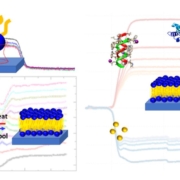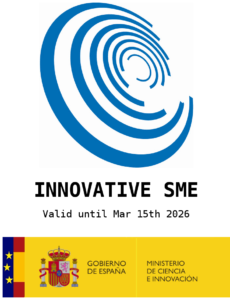Thickness dependent CO2 adsorption of poly(ethyleneimine) thin films for direct air capture
Authors: John R. Hoffman, Avery E. Baumann, Christopher M. Stafford
Journal: Chemical Engineering Journal
Abstract
Mesoporous silica impregnated with polyethyleneimine (PEI) has been shown to be a suitable material for the direct air capture (DAC) of CO2. Factors such as CO2 concentration, temperature, and amine loading impact overall capture capacity and amine efficiency by altering diffusional resistance and reaction kinetics. When studied in the impregnated 3-dimensional sorbent material, internal diffusion impacts the evaluation of the reaction kinetics at the air/amine interface. In this work, we designed a novel tandem quartz crystal microbalance with dissipation (QCM-D) and polarization modulation infrared reflective absorption spectroscopy (PM-IRRAS) instrument. CO2 adsorption kinetics of the PEI-based amine layer in a 2-dimensional geometry were studied at a variety of film thicknesses (10 nm to 100 nm), temperatures (25 °C to 80 °C), and CO2 concentrations (5 % and 0.04 % by mole fraction). Total CO2 capture capacity increased with film thickness but decreased amine efficiency, as additional diffusional resistance for thicker films limits access to available amine sites. The capture capacity of thick films (>50 nm) is shown to be limited by amine availability, while capture of thin films (<50 nm) is limited by CO2 availability. A 50 nm PEI film was shown to be optimal for capture of 0.04 % (400 ppm) CO2. The adsorption profiles for these conditions were fitted to pseudo-first order and Avrami fractional order models. The reaction process switches between a diffusion limited reaction to a kinetic limited reaction at 80 °C when using 5 % CO2 and 55 °C when using 0.04 % CO2. These results offer accurate analysis of adsorption of CO2 at the air/amine interface of PEI films which can be used for the design of future sorbent materials.






